
All categories
Featured selections
Trade Assurance
Buyer Central
Help Center
Get the app
Become a supplier

(125845 products available)

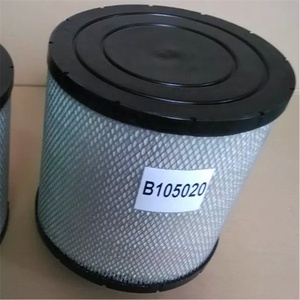





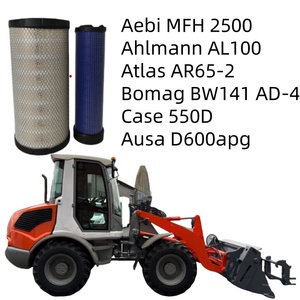

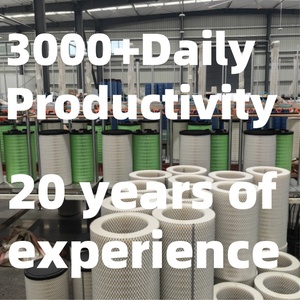



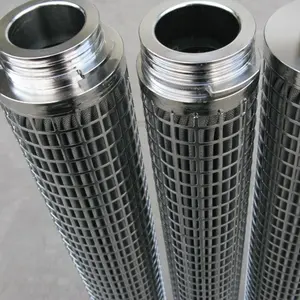


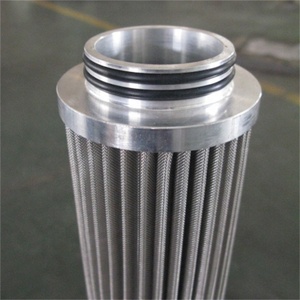




















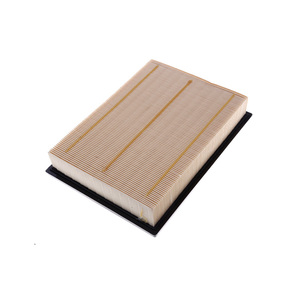
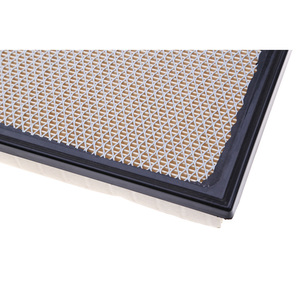
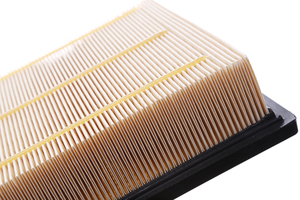
Industrial air filter elements are crucial for systems that work under high pressure and/or high temperature, such as compressors, hydraulic systems, and other sensitive machinery. They remove pollutants from the incoming air to prevent damage and ensure optimal operation. There are several types of air filter elements commonly used in various applications, specifically designed to meet specific industry needs.
Mechanical Separation Filters
These filters remove particulates from the air through mechanical means. The filter media, often made from fibers or mesh, captures larger particles by straining them out as air passes through. Common types of mechanical separation filters include:
Fiber Mats: These consist of fine fibers that capture particles through a combination of interception, inertial collision, and sedimentation. They are pleated filter elements that include multiple folds of the filter material, increasing the surface area available for trapping particles to ensure longer filter life.
Metal Screens: Metal screen filters have a long service life and withstand constant temperature and pressure. They capture larger particles through straining but are less effective at filtering fine dust compared to other media.
Paper Elements: These are commonly used in smaller, less demanding applications. They are inexpensive and effective for general air filtration but cannot withstand high humidity environments or heavy loads.
Cyclone Separators
Cyclone separators use centrifugal force to remove particles from the air. As the air spins, heavier particles are thrown against the walls of the separator and collected in the bottom as sludge while clean air exits through the central outlet. They are often used as a pre-filter to reduce the load on downstream filters. They are effective for larger particulate removal and have no filter media to replace, hence low maintenance cost. However, they are not effective for capturing fine dust, thus mostly used in combination with other filter types.
Electrostatic Filters
These filters use an electric charge to attract and capture particles from the air. The charged filter media causes particles to adhere to the fibers, even if the particles are smaller than what the fibers could normally intercept. They are especially good at capturing smoke, dust, and other fine particles.
Chemical Separation Filters
Chemical separation filters, also known adsorption filters, utilize activated filter media to capture gaseous pollutants like volatile organic compounds (VOCs). They contain charcoal, silica gel, or zeolite to absorb moisture and/or other chemical contaminants from the air, preventing them from entering the industrial system.
Liquid Filters
These are used in industries where air might carry liquid mist or vapors, such as chemical manufacturing and oil refineries. They use specialized media to capture liquid particles from the air.
Quality Filter Media
The air filter element is made of quality filter media, which includes paper, synthetic fibers, electrostatic fibers, or woven wire mesh, depending on the application and type of filter. It should be durable enough to withstand high airflow and filter high volumes of air in an industrial setting for extended use. For example, heavy-duty synthetic fibers are often used in commercial and industrial settings because they are strong, durable, and can be washed and reused.
Reinforced Pleats and Frames
Most industrial air filters have pleated filter media to increase surface area and capture more particles. The pleats must be reinforced to ensure the filter can withstand the pressure differentials in industrial air systems. Typically, metal or plastic frames are used to enhance the filter's rigidity and extend its lifespan while ensuring that the media does not collapse under heavy loads. Plastic frames are preferred in environments that may corrode metal due to high humidity or chemical exposure.
High-Quality Bonding and Stitching
Alloying high-quality filter media ensures strength and durability. Low-quality stitching may allow air to bypass the filter or even release trapped particles back into the air, so only well-constructed, high-quality filters should be used in industrial applications where safety is a priority.
Heat and Chemical Resistance
In industries like manufacturing, mining, and oil and gas, the filter element should be made of heat-resistant materials to prevent degradation from extended exposure to high temperatures. Chemical-resistant filters are also necessary in the chemical industry to prevent filter media from breaking down due to exposure to harsh chemicals.
Coatings and Treatments
Various additional treatments may be applied to air filter elements to enhance their durability. For example, anti-static treatments reduce the likelihood of electrostatic discharge, which can damage sensitive equipment and ignite flammable particles in hazardous environments. Anti-microbial coatings prevent mold and bacteria growth on the filter in humid environments. Grease and oil barriers protect the filter media in kitchens and manufacturing facilities where airborne grease and vapors are prevalent.
An air filter is essential anywhere that air quality must be controlled to protect equipment, processes, or people. Scenarios where air filter elements are needed include, but are not limited to, the following:
Industrial Manufacturing
A wide variety of air filters are used in industrial manufacturing facilities to protect machinery, ensure product quality, and maintain air safety. For instance, filters for air-compressor intake protect the centrifugal blower from particulates that could cause wear and tear. Similarly, paint booths and assembly lines have filters to control air quality and prevent contaminants from interfering with product finishes or electronic components.
Food Processing
Filters reduce airborne contaminants that may carry bacteria- or virus-laden particles into food products during processing, packaging, or handling. The oil and grease filter element for food processing removes airborne grease and vapors to maintain a safe and sanitary environment. This prevents greasy residues from contaminating the machinery, thus protecting the food products from chemical contamination and reducing fire hazards.
Pharmaceuticals and Biotechnology
These industries have very particular requirements for air quality control. Filters are used to prevent contaminants from entering cleanrooms, affecting product quality, or compromising process integrity. For instance, chemical separator filters remove VOCs and other chemical agents that could interfere with sensitive processes or contaminate products. HEPA filters are frequently used to ensure that even the smallest particles are trapped.
HVAC Systems
HVAC systems utilize air filter elements to ensure that the air circulating through commercial buildings, industrial facilities, and large residential complexes is clean and safe to breathe. HEPA and ULPA filters are commonly used in this context to reduce allergy and asthma while improving overall employee well-being and increasing productivity. This is because good air quality can help lessen sick building syndrome and improve employee well-being.
Oil and Gas Industry
In the oil and gas industry, air filters protect equipment such as compressors and turbines from dust and other airborne particles. This reduces wear and tear, increases efficiency, and prevents costly breakdowns while improving air quality around drilling sites and refineries. This is important, especially for workers who are in remote areas without easy access to medical care.
Agriculture
The agriculture industry uses air filters in equipment such as tractors, harvesters, and other machinery to protect engines from dust and pollen. This ensures the machinery operates effectively and reduces maintenance costs while protecting the indoor air quality of chicken coops and other agricultural facilities. This ensures the animals are healthy and the products remain safe for consumption.
Filter Media Material
They are typically made of paper, cotton, microfiber, or synthetic polymer blends, which include polyester or polypropylene. Each material has advantages, depending on the application to which the filter is put. For instance, while cotton provides deep pleat filtration to ensure high filter efficiency, synthetic fibers are durable, resist moisture, and can be washed and reused.
Filter Thickness
This influences the filter's capacity and efficiency. Common thicknesses range from 1 to 4 inches. Thicker filters tend to have a higher dirt capacity and a longer lifespan before needing replacement. However, they are often more expensive and harder to fit into compact filter slots.
Filter Frame Material
The frame of the filter element is the supporting structure of the filter media and is usually made of galvanized steel, aluminum, or plastic. Each material has pros and cons: for example, plastic frames are lightweight, corrosion-resistant, and, therefore, ideal for humid or chemically harsh environments, while aluminum frames are more rigid and provides better structural integrity for heavy-duty applications.
Dust Holding Capacity
This refers to the amount of dust the filter can collect before it needs to be replaced. It is typically measured in grams per square meter (g/m2). High-efficiency filters are often designed with densely packed or electrostatically charged filter media to maximize dust-holding capacity and ensure longer filter life.
Filter Efficiency
This indicates how well the filter can remove airborne particles. It is commonly expressed with the Minimum Efficiency Reporting Value (MERV) or Eurovent filters efficiency class. High-efficiency filters (e.g., HEPA or ULPA) have efficiency ratings between 99.97-99.999% for particles as small as 0.3 microns.
Easy Replacement and Maintenance
Many industrial air filters are designed to be easily accessible for replacement and maintenance. Some may even have a quick-release mechanism. This helps minimize downtime and allows for more efficient filter changes.
High Filtration Efficiency
Industrial air filters are specifically designed to remove the maximum amount of airborne contaminants from the incoming air. They capture everything, from large particles like dust and pollen to microscopic pollutants, ensuring clean air for industrial processes.
High Dirt Holding Capacity
Industrial air filters have high dust-holding capacity to allow them operate efficiently for longer periods before requiring maintenance. This means they can collect a larger amount of airborne particles without becoming clogged, reducing the frequency of filter changes.
Thermal Stability
They are designed to withstand extreme temperatures, often exceeding 200 degrees Celsius (392 degrees Fahrenheit). This prevents filter degradation. Thermal stability is critical for industries that operate under high-temperature conditions, such as manufacturing and automotive.
Moisture Resistance
This prevents filter media from becoming saturated and losing its efficiency. Moisture resistance is particularly important in industries with high humidity or wet processes, such as food and beverage or wastewater treatment, or in outdoor applications where dew or rain exposure is likely.
Anti-Static Properties
Static electricity can cause particles to adhere to the filter media, making it difficult to remove them. It can also damage sensitive electronic equipment. Therefore, many industrial air filters incorporate anti-static elements to neutralize static charge. This helps minimize particle adhesion and ensures the filter operates effectively without risking damage to nearby equipment.
A1. The frequency of air filter replacement largely depends on the specific environment, type of filter, and operational conditions. However, as a general guideline, it is advisable to check them every month and replace them every two to three months. In dusty or high-particle environments, filters may need to be changed more frequently; in cleaner conditions, they may last longer.
A2. Failing to maintain air filters can result in numerous problems. Clogged filters restrict airflow, leading to decreased equipment efficiency and increased energy consumption. Particles not captured by a worn filter can damage machinery, resulting in costly repairs. Additionally, poor air quality can affect worker safety and product quality, leading to increased operational downtime and long-term financial losses.
A3. Not all industrial air filters are designed to be washable and reusable. However, filters made from durable materials, such as synthetic fibers or metal mesh, can often be washed and reused. Moreover, while many pleated filters are disposable, some high-efficiency filters, like electrostatic filters, are designed to be cleaned and reused, providing cost savings in the long run.
A4. While some air filter elements are versatile enough to be used in multiple industries, it's ideal to use application-specific filters. Each industry has unique requirements for filter efficiency, dust-holding capacity, and resistance to elements like humidity, chemicals, or extreme temperatures. This makes sure the filter performs optimally and protects equipment from damage.
A5. To select the right air filter element for the business, the most important considerations are the nature of the airborne contaminants and the key operational requirements. For instance, HEPA filters are ideal for capturing microscopic particles in sensitive environments like clean rooms, while chemical filters are suited for controlling VOCs and other chemical agents. The right filter will protect the equipment, improve air quality, and ensure operational efficiency without incurring excessive costs.